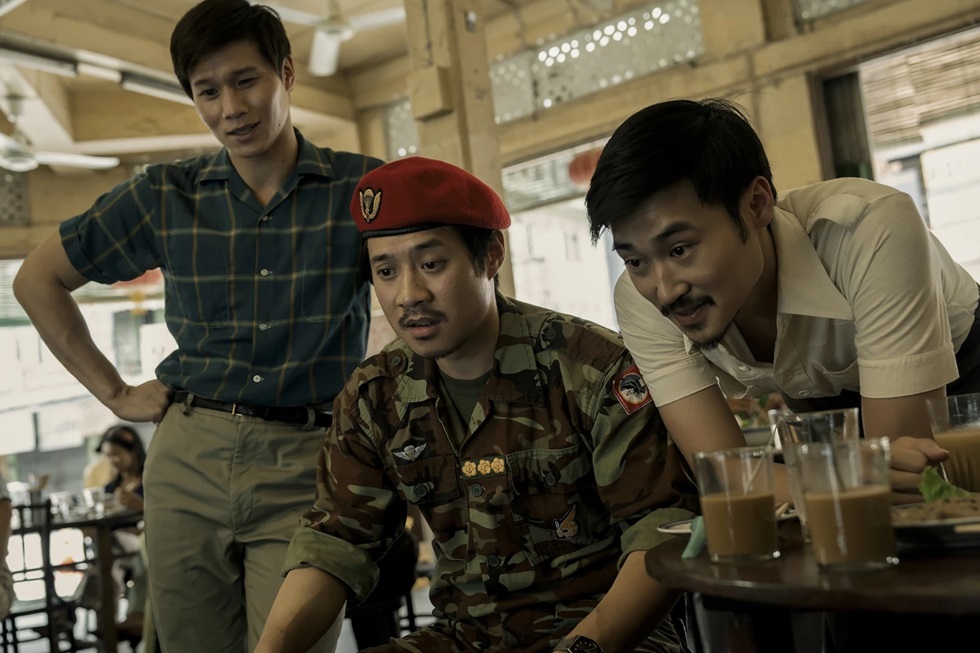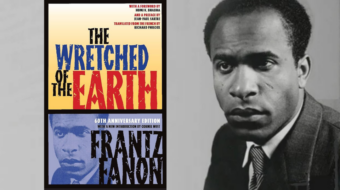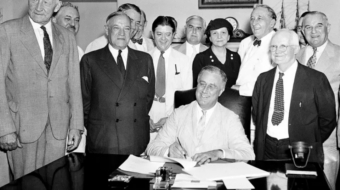
HBO’s The Sympathizer, from the Pulitzer Prize-winning novel by Viet Thanh Nguyen, opens with a quote: “All wars are fought twice, once on the battlefield and the second time in memory.” It’s not simply memory that the book and the series are concerned with, though, it’s “representation,” that is social memory refracted through in this case a hostile media, which often exists to “correct” the sins and failures of bloody imperial overreach.
“On the battlefield,” Vietnam was lost by the U.S. and its tiny number of, by the conclusion of the war, collaborators, although the cost was high with over 1 million Vietnamese killed for the crime of wanting to free their country from first French and then American domination. “In memory,” though, on American movie screens particularly, the Americans won the war, with Rambo’s “brave” rescuing of prisoners, just one in a cacophony of works with “outnumbered” soldiers prevailing against all odds, with the films always forgetting to remind us that the soldiers were “outnumbered” because the majority of the people in the country opposed their land, resources and strategic position in Southeast Asia being appropriated by foreign conquerors. High-end films (Platoon, Apocalypse Now) generally elided the Vietnamese, having them fade into a faceless background where they were often machine-gun fodder.
The Sympathizer goes some way toward addressing this grievance, but in the end not far enough, ultimately retreating into generic considerations which quash what could have been a more far-reaching understanding of the war. The series is set near the end of the conflict, opening four months before what in the imperial West is termed “the fall of Saigon” but what for the Vietnamese was “the liberation of Saigon.” The end is nigh, and everyone knows it as The Captain, a North Vietnamese spy attached to “The General,” is anticipating revealing his cover and welcoming the liberation troops entering the city.
Depicting this moment would have been a welcome addition to the war’s representation, since it was the beginning of a now rapidly developing economy which continues to grow by leaps and bounds and which avoided the ongoing tragedy of Korea, presciently witnessed by the series’ producer and director, Korea’s Park Chan-Wook.

Instead, the spy genre dominates, and The Captain is ordered to accompany The General as he is being airlifted out of the country in order to monitor his activities in the U.S. The exigencies of the genre demand he remain undercover and suggest, in his being ferried into the belly of the beast, the superb Russian series 17 Moments of Spring, one of the greatest of all spy stories about a Russian officer in World War II who infiltrates the Gestapo. The undercover motif also recalls The Americans, the series about Russian spies in Washington where the spies’ point of view and their patriotism were generally respected.
The frantic rush to the airport as the empire deserts those it has used (here not giving The General the seats he requests for his extended family) recalls not only its loss of Vietnam but the more recent debacle in Afghanistan.

While some of the representation of the war is rejected or complicated, there is a meaty role for the CIA agent, Claude (Robert Downey Jr.) hamming it up in a cigar-chomping cross between The Quiet Man’s Brendan Fraser and James Bond’s Felix Leiter, but there is not the reflective quality of the tragedy in Graham Greene’s depiction, canceled by the bombast and scene-chewing of the Felix Leiter overlay.
In even suggesting that there might be another side to the Vietnam War, The Sympathizer begins to break new ground. But the series is also careful to cover its tracks, that is, to not present the war for Vietnamese independence—Ho Chi Minh had seen himself as his country’s George Washington before being rejected by the Americans—in too favorable a light as The Sympathizer’s story is told as a flashback from a Vietnam prison, warning us in advance that the movement for independence has run off the rails and taken a repressive turn. Nevertheless, the novel and the series begin a long-postponed, more realistic and complicated portrayal of yet another imperial war as the U.S. stands on the brink of ever more global engagements and possibly repeating the same mistakes in the Middle East.
The trailer can be viewed here.
We hope you appreciated this article. At People’s World, we believe news and information should be free and accessible to all, but we need your help. Our journalism is free of corporate influence and paywalls because we are totally reader-supported. Only you, our readers and supporters, make this possible. If you enjoy reading People’s World and the stories we bring you, please support our work by donating or becoming a monthly sustainer today. Thank you!










